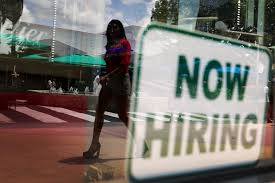
The key US non-farm payroll data for July is out early this afternoon with expectations that the American economy added 235,000 jobs in the month and the unemployment rate at 6.1% and there’s a few nervous investors out there as the markets await the figures. If the number tops 200,000 again, it would be the first time the U.S.economy has notched up six consecutive months of 200,000 plus gains since 1997.
Markets around the world fell heavily yesterday and today looks no better so far. The Dow Jones Industrials dropped 317 points to finish at 16,563, the largest drop since February and the the S&P 500 dropped 39 points to 1,931, the largest drop since April. The S&P 500 had a record close of 1,988 on July 24th. The CBOE Vix index or the fear gauge, has climbed nearly 35% since the highs, 47% in July and is at the highest level for 3 months. Today the markets don’t look much better with expectations of a further 70 point drop in the Dow. The FTSE 100 is currently down 70 points at 6,654.
Investors are increasingly getting worried that the US Federal Reserve might start to increase interest rates sooner rather than later after a raft of positive economic data and rising bond yields mean that the equity markets are less enticing. A strong number for US GDP didn’t help matters. In addition, geo-political risks in Israel, Argentina and the Ukraine have also raised fears and questions are being asked whether the market warrants being close to all time highs. Argentina missed a deadline to pay $539 million (£317 million) in bond interest payments and now it is up to the International Swaps and Derivatives Association to rule whether a failure-to-pay “credit event” has occurred.
With the second quarter US earnings season over half way done, 74% of S&P 500 companies have beaten earnings estimates with corporate earnings growing at a rate at 8.5%, excluding financials, the highest since the third-quarter in 2011. So corporate profitability on the whole seems to be keeping up with very high expectations.
Lets see what the non-farm payroll number brings at 1.30pm!
Contrarian Investor UK
IMPORTANT: The posts I make are in no way meant as investment suggestions or recommendations to any visitors to the site. They are simply my views, personal reflections and analysis on the markets. Anyone who wishes to spread bet or buy stocks should rely on their own due diligence and common sense before placing any spread trade.
by contrarianuk
A few market nerves before US jobs report
Aug 1, 2014 at 9:29 am in Market Commentary by contrarianuk
The key US non-farm payroll data for July is out early this afternoon with expectations that the American economy added 235,000 jobs in the month and the unemployment rate at 6.1% and there’s a few nervous investors out there as the markets await the figures. If the number tops 200,000 again, it would be the first time the U.S.economy has notched up six consecutive months of 200,000 plus gains since 1997.
Markets around the world fell heavily yesterday and today looks no better so far. The Dow Jones Industrials dropped 317 points to finish at 16,563, the largest drop since February and the the S&P 500 dropped 39 points to 1,931, the largest drop since April. The S&P 500 had a record close of 1,988 on July 24th. The CBOE Vix index or the fear gauge, has climbed nearly 35% since the highs, 47% in July and is at the highest level for 3 months. Today the markets don’t look much better with expectations of a further 70 point drop in the Dow. The FTSE 100 is currently down 70 points at 6,654.
Investors are increasingly getting worried that the US Federal Reserve might start to increase interest rates sooner rather than later after a raft of positive economic data and rising bond yields mean that the equity markets are less enticing. A strong number for US GDP didn’t help matters. In addition, geo-political risks in Israel, Argentina and the Ukraine have also raised fears and questions are being asked whether the market warrants being close to all time highs. Argentina missed a deadline to pay $539 million (£317 million) in bond interest payments and now it is up to the International Swaps and Derivatives Association to rule whether a failure-to-pay “credit event” has occurred.
With the second quarter US earnings season over half way done, 74% of S&P 500 companies have beaten earnings estimates with corporate earnings growing at a rate at 8.5%, excluding financials, the highest since the third-quarter in 2011. So corporate profitability on the whole seems to be keeping up with very high expectations.
Lets see what the non-farm payroll number brings at 1.30pm!
Contrarian Investor UK
IMPORTANT: The posts I make are in no way meant as investment suggestions or recommendations to any visitors to the site. They are simply my views, personal reflections and analysis on the markets. Anyone who wishes to spread bet or buy stocks should rely on their own due diligence and common sense before placing any spread trade.